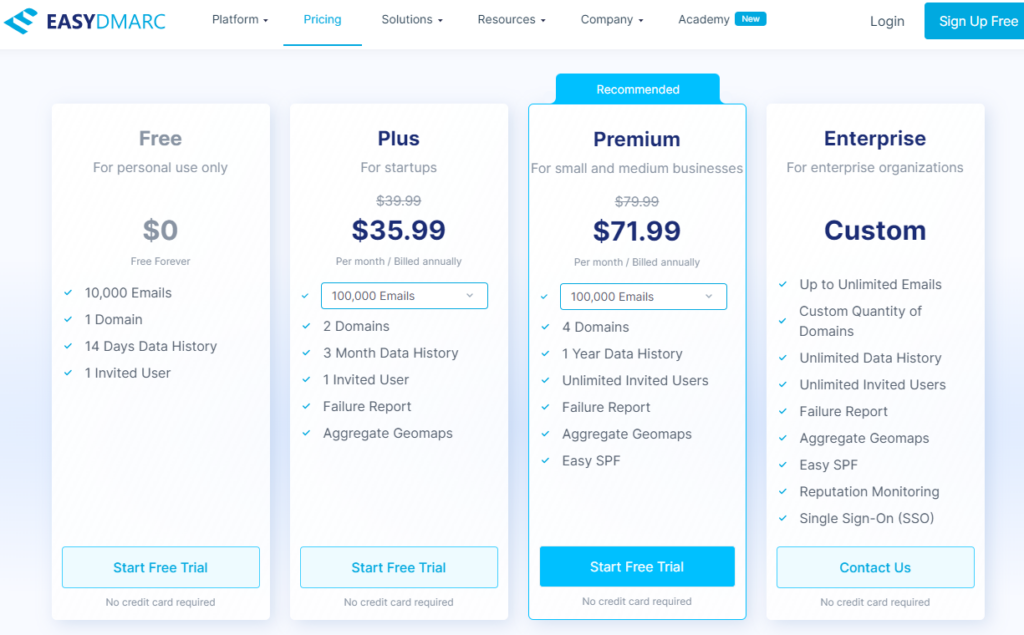The rise of email spoofing, phishing attacks, and spam has raised concerns about email security.
Organizations are turning to DMARC (Domain-based Message Authentication, Reporting, and Conformance) to combat these threats.
A DMARC analyzer is a powerful tool that helps organizations monitor and analyze their DMARC records to protect their email domains from unauthorized use and enhance email deliverability.
In this blog post, we will explore the functionalities of a free DMARC analyzer, the benefits of using it, common issues it can identify, and some popular free DMARC analyzer tools available to bolster email security.
What Does a DMARC Analyzer Do?
A DMARC analyzer plays a vital role in ensuring the proper implementation and management of DMARC records. Here are some of the key functionalities of a DMARC analyzer:
- Display DMARC Report Formats: A DMARC analyzer can generate and display DMARC report formats, including DMARC Aggregate Reports (RUI) and Forensic Reports (RUF). These reports provide valuable insights into email authentication results, allowing organizations to identify and address potential security threats.
- Verify DMARC Records: By validating the DMARC records, a DMARC analyzer ensures that they are correctly configured and functioning as intended. This verification process is essential to guarantee the authenticity of incoming emails and prevent unauthorized access.
- Provide Full Visibility into Email Senders: A DMARC analyzer grants organizations complete visibility into all email senders using their domain. This visibility helps distinguish legitimate senders from fraudulent ones, empowering organizations to take appropriate action against malicious actors.
- Improve Email Deliverability: The DMARC analyzer contributes to improving email deliverability by reducing the likelihood of emails being marked as spam or rejected by recipients’ servers. This improvement stems from the analyzer’s ability to verify the authenticity of incoming emails before they reach the recipients’ inboxes.
Benefits of Using a DMARC Analyzer
Implementing a DMARC analyzer offers several benefits to organizations seeking to enhance their email security and deliverability. Here are some key advantages:
Protecting Reputation, Data, and Customers
With DMARC, organizations can safeguard their reputation by preventing email spoofing and phishing attacks. This protection extends to the security of customers’ personal data, as DMARC helps deter unauthorized access.
Improving Email Deliverability
DMARC’s verification process ensures that only legitimate emails reach recipients’ inboxes. Consequently, it reduces the chances of legitimate emails being flagged as spam or rejected by email servers, thereby improving email deliverability.
Control of Email Delivery for the Domain
A DMARC analyzer gives organizations full control over email delivery for their domains. This control empowers them to filter out fraudulent emails before they even reach their inboxes.
Full Visibility into Email Senders
The DMARC analyzer’s ability to provide complete visibility into email senders enables organizations to distinguish genuine senders from malicious ones. This insight is crucial for taking appropriate actions against fraudulent actors.
Preventing Spoofing and Phishing Attacks
DMARC’s framework allows email senders and receivers to collaborate, effectively preventing spoofing and phishing attacks by rejecting emails from unknown sources.
A DMARC analyzer helps organizations protect their reputation, data, and customers, enhance email deliverability, control email delivery for their domains, gain full visibility into email senders, and prevent spoofing and phishing attacks.
Common Issues Identified by a DMARC Analyzer
A DMARC analyzer serves as a valuable tool for identifying and addressing common issues related to DMARC implementation. Some of the key issues a DMARC analyzer can help identify include:
- Misconfigured DMARC Records: A DMARC analyzer can pinpoint misconfigured DMARC records that might hinder email deliverability or authentication. This includes issues with DMARC policy, alignment modes, and reporting settings.
- Inactive Domains: DMARC requires all domains to be active and in use. A DMARC analyzer can help identify inactive domains that might disrupt DMARC implementation.
- SPF and DKIM Authentication Failures: DMARC relies on SPF and DKIM authentication to verify email authenticity. A DMARC analyzer can detect SPF and DKIM authentication failures, helping organizations rectify these issues promptly.
- Phishing and Spoofing Attacks: Through comprehensive visibility into email senders, a DMARC analyzer can help identify phishing and spoofing attacks, allowing organizations to take prompt action against fraudulent senders.
A DMARC analyzer is an indispensable tool for organizations seeking to identify and resolve common issues associated with DMARC implementation. It helps ensure the effective protection of their email domains from security threats.
Popular Free DMARC Analyzer Tools Available
Several popular free DMARC analyzer tools are available for organizations seeking cost-effective solutions.
Here are some of the best options:
1. EasyDMARC

EasyDMARC offers a free DMARC analyzer and a range of additional free tools to monitor DMARC records and generate reports. Their DMARC analyzer is especially useful for beginners, and their platform offers testing, reporting features, and managed solutions.
2. PowerDMARC
PowerDMARC provides a free DMARC analyzer and reporting SaaS platform that allows organizations to monitor and analyze DMARC and email authentication systems on their domains. They offer a range of DMARC services to suit various business needs.
3. MxToolbox
MxToolbox offers a free DMARC report analyzer that transforms DMARC aggregate XML reports into human-readable formats. These reports include valuable data on message volumes, SPF/DKIM authentication rates, and actions taken on messages (quarantine/reject).
4. GlockApps
GlockApps offers a free DMARC checker that enables users to receive 10,000 DMARC messages free every month. Their DMARC analyzer tool helps visualize DMARC reports in a user-friendly manner and includes free SPF, DKIM, DMARC monitoring every two hours.
5. Postmark
Postmark provides a free DMARC monitoring tool, offering weekly email reports for personal domains.
6. Mimecast
Mimecast offers a free DMARC record check tool, allowing users to test and verify the validity of their DMARC records.
These free DMARC analyzers offer a range of features and capabilities to help organizations monitor and analyze their DMARC records, generating valuable insights to enhance email security.
How to Interpret DMARC Reports Generated by an Analyzer
Interpreting DMARC reports generated by a DMARC analyzer can be challenging but is crucial to understanding the performance of DMARC implementation. Here are some tips for interpreting DMARC reports effectively:
- Understand the Report Format: Familiarize yourself with the DMARC report formats, whether they are DMARC Aggregate Reports (RUI) or Forensic Reports (RUF). Each format provides specific insights into email authentication results.
- Analyze the Data: DMARC reports contain a wealth of data, including information about email volume, authentication results, and sources of email traffic. Carefully analyze this data to identify any issues with DMARC implementation.
- Look for Patterns: Patterns in email traffic and authentication results can provide valuable insights. Identifying recurring issues can help organizations take timely action against potential security threats.
- Use a DMARC Analyzer Tool: Utilize a DMARC analyzer tool to simplify interpretation and gain valuable insights into DMARC implementation.
By effectively interpreting DMARC reports, organizations can proactively address security issues, optimize DMARC settings, and ensure the robust protection of their email domains.
Conclusion
A free DMARC analyzer is a powerful tool that organizations can leverage to bolster their email security and deliverability.
Monitoring and analyzing DMARC records helps you protect your reputation, data, and customers from email spoofing, phishing attacks, and spam.
With full visibility into email senders and the ability to detect common issues, a DMARC analyzer plays a crucial role in maintaining the integrity of email communication.
With these popular free DMARC analyzer tools and interpreting their reports effectively, organizations can fortify their email security and ensure a safe and seamless communication experience for their users.
Related:
